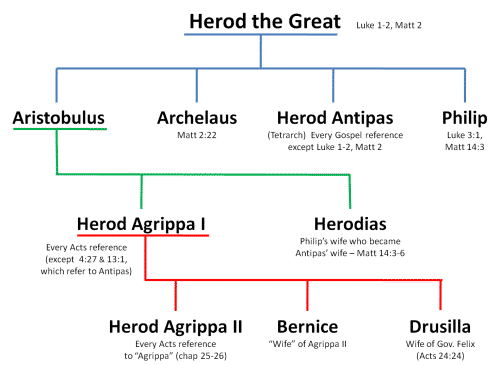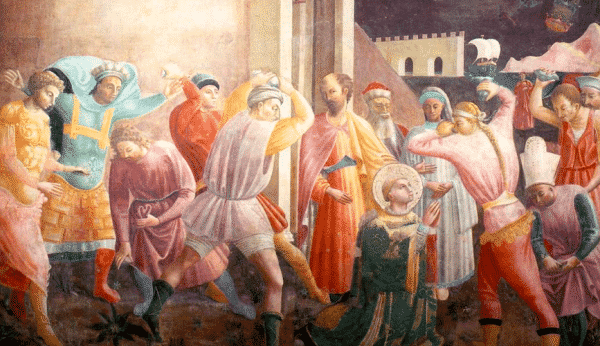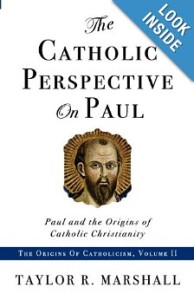Was Saint Paul Related to Herod? 7 Reasons Paul was Herodian
Saint Paul says that he is of the tribe of Benjamin and a Hebrew of Hebrews (Phil 3:5). In my book The Catholic Perspective on Paul (2010), I assembled a historical biography of Saint Paul and showed how his life informed his theology. Since then, I have been trying to fit another piece of the Paul puzzle – Paul’s relation to Herod.
Paul was originally a Herodian. By “Herodian” I mean that he seems to have connections with the family and court of the Herods. Theologically, Saul/Paul favored the theology of the Pharisees before his conversion but his family connections relate him to the inner circle of Herod Agrippa.
Here are the reasons demonstrating that Saul/Paul had Herodian connections
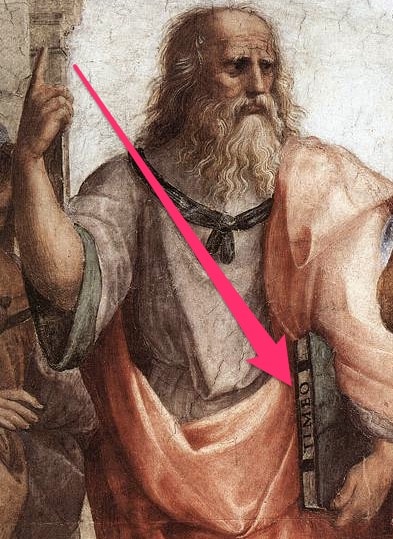
1. Saul/Paul was highly educated both in Hebrew Scripture/Tradition but also in Greek philosophy. He seems familiar, for example with Plato’s Timaeus. He is Hebrew, but he also dabbles in Gentile learning and culture. This is the Herodian style: Jewish identity, loyalty to Jerusalem, familiar with the priests, but appreciative of Gentile power and learning. Sounds like Paul…
2. Saul/Paul was a Roman citizen. Jews were not typically citizens. We learn that Saul/Paul gained his Roman citizenship by birth. This means that his parents were Hebrews with Roman privilege. In the first century, Hebrews with Roman privilege were linked to the Roman appointed rulers of Palestine – the Herod’s.
3. Saul/Paul officially persecuted Christians on behalf of the Temple authorities. This is odd. Think about how hard it was for the Sanhedrin to kill Jesus Christ. Back and forth between the Roman Pontius Pilate and the Roman appointed “King” Herod Antipas the Tetrarch. Killing Christ was complicated and difficult.
And yet somehow we are to believe that Saul received certificates of authority in around the year AD 36 to go about capturing and killing Christians without trial…even as far away as Damascus? Ahem, this is the Roman Empire with laws and rules. A man can’t get permission from the priests of one city and then go and capture people in another city.
How did Saul/Paul get that power? The High Priest and the Jewish Sanhedrin in Jerusalem could not have authorized Saul to arrest Christians in Damascus. The High Priest and the Jewish Sanhedrin in Jerusalem had no power in Damascus, a city in the Roman Province of Syria. Jerusalem belonged to the Roman Province of Judea. Saul seems to have gained an authority entrusted to him by a civil power connected to the Temple. This means that Saul needed religious authority (Temple) and he needed Roman authority in Damascus (King Aretus IV of Damascus).
[callout]King Aretus IV of Damascus. King Aretus IV who ruled over Damascus during the period of Saul/Paul’s conversion was the father-in-law of Herod Antipas the Tetrarch (d. AD 39). You might remember how Saint John the Baptist was preaching against Herod Antipas for divorcing his wife in order to marry his brother’s wife Herodias. Well Saint John the Baptist was defending the honor of Herod Antipas’ first wife Phasaelis – the daughter of King Aretus IV. Small Herodian world![/callout]
Which one politician of this period had deep connections with the High Priesthood at the Temple in Jerusalem and political influence in Damascus? Who was the only man on earth who could arrange for Saul to act on behalf of the High Priest in the foreign city of Damascus? Oh that’s right, Herod Antipas the Tetrarch!
Why was Saul/Paul able to fulfill his desire to persecute Christians on behalf on the High Priest throughout the Roman Empire? Because his family was close to the family of Herod.
4. Saul/Paul is grouped with those raised with Herod Antipas the Tetrarch. “Now there were in the church that was at Antioch certain prophets and teachers as Barnabas and Simeon that was called Niger and Lucius of Cyrene and Manaen which had been brought up with Herod the tetrarch and Saul. (Acts 13.1) The Greek is unclear but there is certainly a group of young Jewish men in Antioch who are associated with Herod Antipas the Tetrarch.
According to Josephus, Herod Antipas the Tetrarch, his full brother Archelaus and his half-brother Philip were raised and educated in Rome (Josephus, Antiquities 17.20–21). Hence, those raised with Herod Antipas the Tetrarch were educated in Rome. I would not be surprised if Saul/Paul had also studied in Rome as a young man, even though he is younger than Herod Antipas the Tetrarch.
5. Saulus/Paulus was not merely a plebian rabbi. He had political clout. When Saul/Paul is arrested, the commander assigns, get this, 470 men to guard Paul’s life!
“Get ready a detachment of two hundred soldiers, seventy horsemen and two hundred spearmen to go to Caesarea at nine tonight. 24 Provide horses for Paul so that he may be taken safely to Governor Felix.” (Acts 23:23)
- 200 soliders
- 70 horsemen
- 200 spearmen
Yes, Paul was a Roman citizen, but Roman citizen’s didn’t normally receive 470 body guards. Saul/Paul was being protected because he was connected to the family of Herod Agrippa.
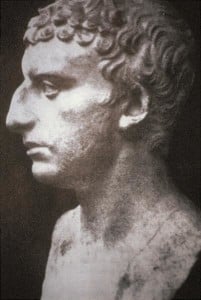
6. Josephus refers to a “Saulus” who persecuted people in Jerusalem. From the Antiquities (20.9.4) of Josephus:
“Costobarus also, and Saulus, did themselves get together a multitude of wicked wretches, and this because they were of the royal family; and so they obtained favour among them, because of their kindred to Agrippa; but still they used violence with the people, and were very ready to plunder those that were weaker than themselves.”
Is this the same “Saul”? It’s hard to tell, but a Saul who was “of the royal family” and “kindred to (Herod) Agrippa” and who “used violence with the people” sure sounds like Saul/Paul in his pre-Christian days.
7. Paul identifies his Herodian kinfolk. We don’t need Josephus to tell us about a “Saul ” was also “kindred to (Herod) Agrippa.”
In Romans 16:11 Paul writes: “Greet Herodion, my kinsman.”
Paul has connections in Rome. He even has a Jewish relative in Rome named Herodion! We don’t know who Herodion is, but his name links him to the Roman-Jewish rulers associated with the dynasty of Herod the Great.
Conclusion: Paul as Herodian Pharisee
Some might counter my arguments by stating that Saul/Paul himself clams to have been a Pharisee and not a Herodian.
But this is where things get interesting. The Pharisees and Herodians worked together!
When the Herodians are mentioned in the Gospels (Mark 3:6, 12:13; Matthew 22:16; cf. also Mark 8:15, Luke 13:31-32, Acts 4:27), they are coupled with the Pharisees. For example, in Mark 3:6, the Pharisees plot against Jesus regarding his teaching on the Sabbath day by incorporating the Herodians into their conspiracy. In Mark 8:15, Christ described the alliance of Pharisees and Herod against Him. In Mark 12, the Pharisees and Herodians together, try to trap Christ with their question about paying taxes.
The fact that Saul/Paul was a Pharisee does not disqualify him from being a Herodian. Rather, it substantiates it.
[reminder]Do you have any arguments pro or con regarding my Paul the Herodian thesis?[/reminder]
PS: I plan to revise and update my The Catholic Perspective on Paul to incorporate this new research.
What to Watch Next
SHOP THE TAYLOR MARSHALL STORE
Dive Deeper

GET CONFIDENT IN YOUR FAITH
Explore the fascinating world of Catholic teachings with Dr. Marshall. Together you’ll unpack the brilliant answers the Church gives to tough questions about the Faith. The best part: you go at your own pace. Start this exciting journey today.


 >
>